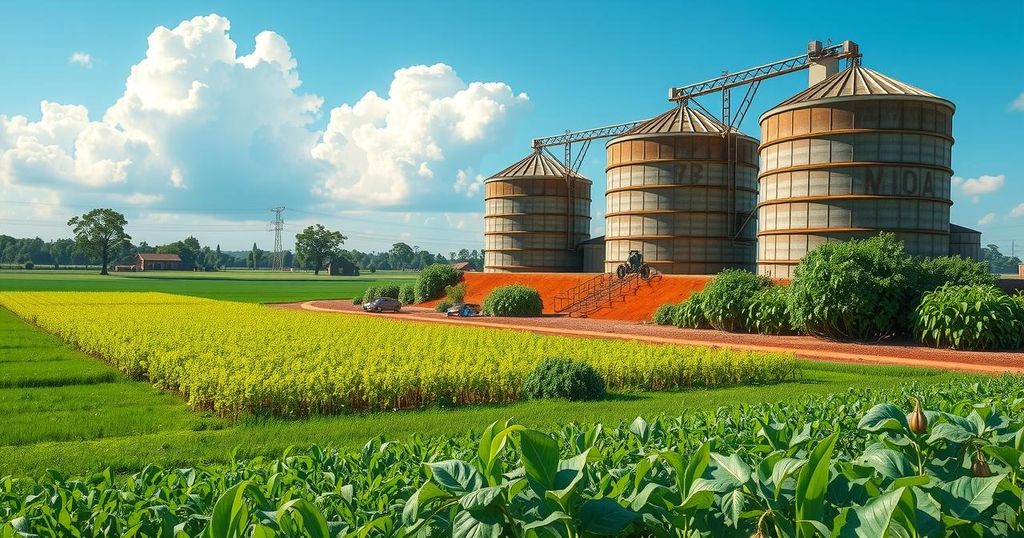Ghana’s agricultural plans frequently stall as new administrations reset policies, leading to inconsistent support for farmers. Key issues include a cycle of political change that undermines ongoing initiatives and the lack of infrastructure for continuity. To improve, experts suggest establishing independent agricultural bodies, a national data hub, and bipartisan agreements to stabilize food security efforts.
Ghana’s agricultural plans seem to falter every few years as new administrations roll out their own visions, complete with catchy slogans and logos. Initiatives like “Operation Feed Yourself,” “Youth in Agriculture,” and more have echoed this pattern. However, once the initial excitement fades, smallholder farmers often find themselves still waiting for promised subsidized inputs, while extension officers struggle under heavy workloads, and many storage facilities sit empty and unused.
The issue often extends beyond mere funding or expertise. Much of the problem stems from a cycle of political change; each new government tends to start afresh, leading to discontinuity rather than continuity in agricultural policy. This constant resetting translates into confusion and often abandonment of prior programs after they’ve been started with so much optimism. In essence, Ghanaian agriculture is more marked by past failures than future crops.
The political discontinuity, a byproduct of democratic governance, poses a significant challenge for agricultural progress. Democracy brings the right of choice, yet it faces pitfalls when it comes to long-term development planning, which often changes as governments evolve. When a new party comes in, ongoing projects are frequently renamed or defunded. This institutional knowledge vanishes, continuity gives way to disruption, and donor support wanes.
One telling sign is the numerous food distribution centers constructed since the 1980s that now stand empty or have been repurposed. These were not inherently flawed ideas; rather, the follow-through faltered post-administration transition. New appointees often start without access to prior data or the systems established by their predecessors. Consequently, this routine amnesia stifles progress and leaves agriculture in a cycle of repeated failures.
For farmers, this unpredictability translates into a growing sense of frustration. One season they have access to fertilizer subsidies, and the next, those very supports are missing or delayed. Prices for local produce fluctuate wildly—a watermelon might cost ten cedis one week and jump to thirty or forty the next. Such volatility adds another layer of difficulty for farmers who already face struggles due to a lack of effective union representation or diminished access to markets.
Moreover, while previous agricultural training programs for youth should bolster the sector, graduates find themselves lost in the shuffle without the proper support to navigate the terrain of land access, finance, or marketplace connections. This chain reaction reinforces a troubling cycle: political affiliation often dictates their prospects, compounding the existing barriers to entry.
Women in agriculture encounter even steeper obstacles. Despite making up a significant portion of the rural workforce, they often find it harder to secure land rights, access to essential resources, and financing options. When programs intended to assist them collapse, the ramifications extend beyond personal setbacks, ultimately threatening overall food production and gender equity in rural spaces.
What is at stake is a fundamental breakdown in agricultural rhythm—consistency is key for managing everything from seeds and fertilizers to harvesting and transportation. Without predictable systems, which are too often disrupted by political audits or funding shortfalls, the entire agricultural ecosystem suffers.
Despite the challenges, Ghana is not lacking in strategic vision. From initiatives like the Savannah Accelerated Development Authority to the Planting for Food and Jobs program, many constructive concepts exist; the failure lies more within the realm of implementation rather than imagination. Countries like Rwanda have insulated their agricultural policies from political interference through long-term development compacts that transcend electoral cycles. Conversely, Ghana’s approach tends to centralize planning but decentralize responsibility, leading to confusion over who is truly in charge.
To solve these deep-rooted issues, the agricultural sector could benefit from three pivotal changes:First, there is a need for an independent Ghana Agricultural Development Authority or a similar body that can operate outside of political whims and ensure continuity in funding and programs. Next, establishing a national digital agriculture hub could provide crucial data on everything from crop outputs to subsidy allocations—real-time information is vital for sound agricultural planning. Lastly, a formal bipartisan commitment from major political parties for a unified national food security plan would provide necessary stability against the fluctuations of election cycles.
Finally, embracing a mindset of continuity is critical. Ghana’s farmers possess remarkable resilience; however, when that resilience is textbook-required every season, the cost becomes unsustainable. Rather than restarting with each new government, let’s commit to seeing things through, embedding systems that remember so we don’t have to relearn hard lessons every four years. Only then can Ghana’s agricultural future thrive.
Feedback is always welcome, and if you have ideas for topics you’d like to see covered, I’m open to suggestions. You can catch me through my Calendly at www.calendly.com/maxwellampong or reach out via my Linktree at www.linktr.ee/themax. Don’t forget to subscribe to the ‘Entrepreneur In You’ newsletter here: https://lnkd.in/d-hgCVPy. This week, I wish you all productive endeavors!
Ghana’s agricultural ambitions stall due to a pattern of political cycles that disrupt ongoing programs and policies. A solution lies in creating institutions with continuity and bipartisan agreements to safeguard long-term agricultural strategies against shifting political winds. Only by prioritizing consistency can the nation’s agriculture flourish and avoid repeating past mistakes.
Original Source: www.newsghana.com.gh






